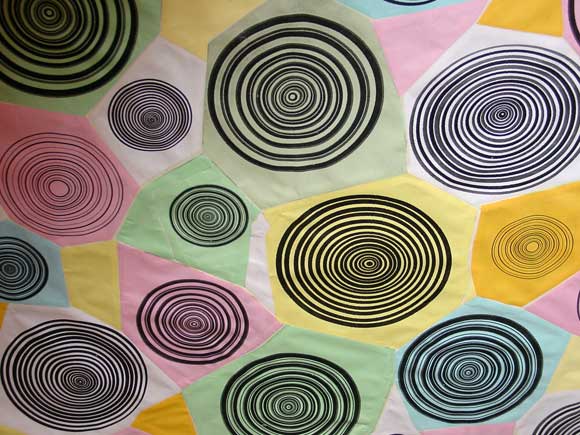View current page
...more recent posts
1997 JODI interview
?: Aren't you afraid that your work will disappear at one point because of technological paradigm changes? For example, that it can't be viewed anymore because browsers change overnight?via camille pb. Update: Another excerpt, about the differences between European and American Internet surfing. This has changed now, I assume?
Paesmans: Fear is not a good condition for work. We have no fear. We make these things because we are angry. People perceive this anger when they are on the other end, at the receiving computer...
?: Why are you angry?
Paesmans: Because of the seriousness of technology, for example. It is obvious that our work fights against high tech. We also battle with the computer on a graphical level. The computer presents itself as a desktop, with a trash can on the right and pull down menus and all the system icons. We explore the computer from inside, and mirror this on the net.
When a viewer looks at our work, we are inside his computer. There is this hacker slogan: "We love your computer." We also get inside people's computers. And we are honored to be in somebody's computer. You are very close to a person when you are on his desktop. I think the computer is a device to get into someone's mind. We replace this mythological notion of a virtual society on the net or whatever with our own work. We put our own personality there.
?: There is this rumor that your site causes people's browsers to crash. Is this true?
Heemskerk: No. That is not a challenge. You could shut down anybody's computer with one line of code. That's not interesting.
?: My impression is that a lot of people look at your site briefly, and then go somewhere else, without ever exploring the details of it: "Oh, there is this site that looks like your computer is broken", and then it's back to CNN or Yahoo or whatever. Does that bother you?
Paesmans: No. Media art is always on the surface. You have to get people very quickly. You need to give them a karate punch in the neck as soon as possible. And then - of course - they don't get to the details, and the site will just sit there for the next five years or ten years, or maybe 100 years. And maybe their children will have the time to explore the details... (laughs)
?: I remember that one of you made a remark about the difference between the European and the American internet. This seems strange, because the internet is supposed to be an international network, that surpasses national boundaries. What do you mean with this, and how does this difference affect you as artists?
Paesmans: The Americans don't have to pay for their connection time...
?: ...because local calls are free in the US...
Paesmans: ...so the internet is just an extension of their local computer.
Heemskerk: It suits their geographical sense as well, because some places are so remote, that they need a means of communication. Not only the internet, but also the telephone. If you pick up the phone in the Netherlands and call somebody in Germany it seems really far. But in the US they spend hours on their phones with their neighbors.
Paesmans: And it's the same with the internet: home office workers for example can stay online for hours, because they don't have to think about the telephone costs.
?: And how does that affect you as artists?
Paesmans: We cannot explore the net the way we want to. For example we cannot check the dutch newspapers in the morning on the net, because connection time is too expensive. You can look at your email, but you cannot look around for an hour, because you have to pay the expensive morning rates for a local telephone call.
Heemskerk: The result is a whole different way of viewing. If you have to pay for the hour you want to see something immediately. You are not prepared to look for something for an hour. But you have to do this on the internet.
Paesmans: Otherwise you just log into the little areas you know. It doesn't become this jungle where you go to discover things you did not know before. But this is just the interesting part of it. It is fun to find things from the Philippines or Morocco. So you have to get organized and do your surfing at night, because the rates are cheaper then.
?: How many hours do you spend online per day?
Paesmans: Not many. Maybe half an hour. If we are working on something it might be longer. I like to look around at Japanese sites, which are incomprehensible to me. The characters are totally unreadable, and they have beautiful screen designs.

Great takedown of New York Times warmonger Thomas Friedman by Matt Taibbi. Here's the News Blog's edit:
'What we have to remember about America's half-baked propaganda machine is that, dumb as it is, it always keeps its eye on the ball. The war in Iraq is lost, everyone knows that, but there are future wars to think about. ... we always have to make sure that the excuse for the next war is woven into the autopsy of the current military failure. That's why to this day we're still hearing about how Vietnam was lost because a) the media abandoned the war effort b) the peace movement undermined the national will and c) the public, and the Pentagon, misread the results of the Tet offensive, seeing defeat where there actually was a victory.
'After a few decades of that, we were ready to go to war again [in Iraq] -- all we had to do, we figured, was keep the cameras away from the bloody bits, ignore the peace movement, and blow off any and all bad news from the battlefield. And we did all of these things for quite a long time in Iraq, but, maddeningly, Iraq still turned out to be a failure.
'That left the war apologists in a bind. If after fixing all of the long-held Vietnam excuses Iraq could still blow up in our faces, that must mean that we not only misjudged Iraq, but we were wrong about why Vietnam failed, too. Now, if we're ever going to pull one of these stunts again, we're going to need to come up with a grander, even more outlandish excuse for why both wars were horrible, bloody failures.
...
'[According to Friedman] both Vietnam and Iraq failed not because they were stupid, vicious occupations of culturally alien populations that despised our very presence and were willing to sacrifice scads of their own lives to send us home. No, the problem was that we didn't make an effort to "re-evaluate tax and spending policies" and "shift resources" into an "all-out" war effort.
'We're talking about one of the richest men in media, a guy who in recent years got still richer beating the drum for this war from his $9.3 million, 11,400 square-foot mansion in suburban Maryland. He is married to a shopping mall heiress worth nearly $3 billion; the Washingtonian says he is part of one of the 100 richest families in America. And yet he has the balls to turn around and tell us that the pointless, asinine war he cheerleaded for failed because we didn't sacrifice enough for it.
...
'[T]rust me, the myth is going to be that you didn't cough up enough for the war. It's your fault we failed, not Tom Friedman's.'
Reddy Kilowatt commercial (1950s). From a time when we needed to be told about the virtues of electricity. (via WFMU)




















mosaic GIF - artist unknown - 15 times
not intended for RSS readers or Safari browsers









bubble GIF - artist unknown - 9 times
not intended for RSS readers or Safari browsers
